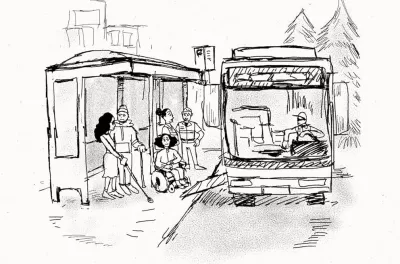Disability advocate Anna Zivarts' new book, “When Driving Isn't An Option: Steering Away from Car Dependency,” explores why and how transportation planning can better serve nondrivers to create a better quality of life for everyone.

One-third of people living in the United States do not have a driver's license. Because the majority of involuntary nondrivers are disabled, lower income, unhoused, formerly incarcerated, undocumented immigrants, kids, young people, and the elderly, they are largely invisible. The consequence of this invisibility is a mobility system designed almost exclusively for drivers. This system has human health, environmental, and quality-of-life costs for everyone, not just for those excluded from it. If we’re serious about addressing climate change and inequality, we must address our transportation system.
In her new book, When Driving Isn't An Option: Steering Away from Car Dependency, disability advocate Anna Letitia Zivarts shines a light on the number of people in the US who cannot drive and explains how improving our transportation system with nondrivers in mind will create a better quality of life for everyone.
Drawing from interviews with involuntary nondrivers from around the US and from her own experience, Zivarts explains how nondrivers get around and the changes necessary to make our communities more accessible. These changes include improving sidewalk connectivity; providing reliable and affordable transit and paratransit; creating more options for biking, scooting, and wheeling; building more affordable and accessible housing; and understanding the unrecognized burden of asking and paying for rides.
Zivarts shows that it is critical to include people who can’t drive in transportation planning decisions. She outlines steps that organizations can take to include and promote leadership of those who are most impacted—and too often excluded—by transportation systems designed by and run by people who can drive. The book ends with a checklist of actions that you, as an individual living in a car-dependent society, can take in your own life to help all of us move beyond automobility.
FULL STORY: When Driving Is Not an Option: Steering Away from Car Dependency

Alabama: Trump Terminates Settlements for Black Communities Harmed By Raw Sewage
Trump deemed the landmark civil rights agreement “illegal DEI and environmental justice policy.”

Study: Maui’s Plan to Convert Vacation Rentals to Long-Term Housing Could Cause Nearly $1 Billion Economic Loss
The plan would reduce visitor accommodation by 25% resulting in 1,900 jobs lost.

Planetizen Federal Action Tracker
A weekly monitor of how Trump’s orders and actions are impacting planners and planning in America.

Waymo Gets Permission to Map SF’s Market Street
If allowed to operate on the traffic-restricted street, Waymo’s autonomous taxis would have a leg up over ride-hailing competitors — and counter the city’s efforts to grow bike and pedestrian on the thoroughfare.

Parklet Symposium Highlights the Success of Shared Spaces
Parklets got a boost during the Covid-19 pandemic, when the concept was translated to outdoor dining programs that offered restaurants a lifeline during the shutdown.

Federal Homelessness Agency Places Entire Staff on Leave
The U.S. Interagency Council on Homelessness is the only federal agency dedicated to preventing and ending homelessness.
Urban Design for Planners 1: Software Tools
This six-course series explores essential urban design concepts using open source software and equips planners with the tools they need to participate fully in the urban design process.
Planning for Universal Design
Learn the tools for implementing Universal Design in planning regulations.
Caltrans
Smith Gee Studio
Institute for Housing and Urban Development Studies (IHS)
City of Grandview
Harvard GSD Executive Education
Toledo-Lucas County Plan Commissions
Salt Lake City
NYU Wagner Graduate School of Public Service


























